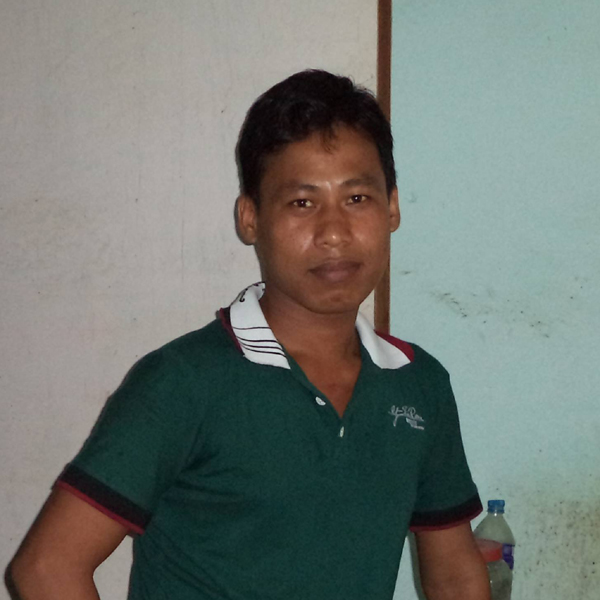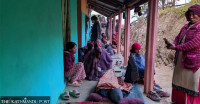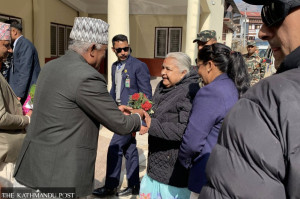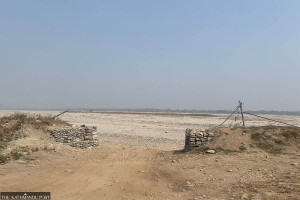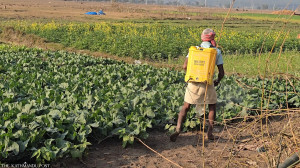Koshi Province
Pindalbari folk pledge votes to those who will build bridge over Biring River
The remote village in Jhapa is cut off from the rest of the district for most of the year due to rise in water level.
Arjun Rajbanshi
Chandra Singh Rajbanshi, aged 60, of Pindalbari in Kachankawal Rural Municipality of Jhapa district owns eight bighas of land. By that standard, Rajbanshi should be able to easily take care of his family. However, for Rajbanshi, raising his children and taking care of his family has always been a daunting task.
The reason behind his helplessness is the steady encroachment of his land by the Biring River. Pindalbari is a small border village in Jhapa surrounded on three sides by India and separated by the Biring River from the rest of the district. The natural demarcation by the river, which has grown to a width of around one kilometre over the years, has made Pindalbari, also known as Sugam, one of the remotest settlements of Jhapa.
Like everywhere else in the district, the fever of local elections has gripped Pindalbari. Political meetings among other programmes are being conducted in the village almost every day and village leaders are attending various meetings at Baniyani and Pathriya of the rural municipality.
During this time of year, the road leading to Pindalbari, which crosses the river bed of the Biring River, looks like any other dirt road and people are travelling to and from the village for election publicity campaigns. But during the rainy season, the water level in the river rises and the village remains cut off from other settlements for almost eight months of the year. However, no political party or leaders have addressed the problems plaguing the village.
“I have eight bighas of land but the Biring River has eroded most of it,” said Rajbanshi.
Rajbanshi said that the river has encroached on the land of almost half of the 165 families residing in the village.
“We cast our votes in the hope that some party will build a bridge over the river and construct embankments,” said Dhanlal Rajbanshi, a local resident. “For over a decade, not even a single political party has shown any interest in constructing a bridge.”
The Nawa Durga Primary School, where over 115 students study, is also in dire condition. The school does not have enough rooms to conduct classes separately. One room of the school is holding classes of Child Development, grades 1 and 2 while the classroom of grade 3 is also being used as an administration office. There is only one toilet in the school and it doesn’t have a working door.
“The children are forced to learn in a poor environment as no one has paid heed to the needs of the school,” said Kailash Rajbanshi, a teacher at the school, “We will only vote for those candidates who are willing to do something to better the lives of the locals.”
There are around 400 voters in the village. The locals say that for this year’s elections, they will cast their votes for whoever will construct a bridge over the Biring River and build an embankment.
“The village is surrounded on three sides by the Indian border and the Indian Seema Suraksha Bal harasses us every chance they get. If the embankment is not constructed before the monsoon season this year, the river will erode almost half of the village,” said Mangal Singh Rajbanshi, a local resident. “This time we will only cast our votes for the one who pledges to construct an embankment and a bridge.”
In the absence of a bridge, a lot of students who have completed their secondary level have not been able to pursue higher studies. There are over 25 youths in the village who have not joined any colleges after completing their Secondary Education Exams.
“The students want to pursue higher education but the Biring River has become a major obstacle,” said Kailash, “The local school conducts classes upto grade 8 only. Students have to travel eight kilometres to get higher education at Rajgad bazaar-based Pashupati Secondary School, and from then their hardship begins.”
No parents or students would want to put their lives at risk by crossing the river, which has increased to around one kilometre in width due to erosion over the years.
“After a short spell of dry season, the river comes back to life and we are stuck here for the remaining eight months. We cannot risk crossing the river to pursue higher studies,” said 19-year-old Sangita Rajbanshi, “During those times, we rely on the Indian side for our basic amenities, including food and health treatment.”
Kailash said that not only students but the local farmers would also benefit if a bridge was built over the Biring River.
“The farmers have to sell their produce at the Indian market as the village is cut off from the Nepal side for almost eight months,” said Kailash. “Nepali farmers are exploited and are forced to sell their produce at the price set by Indian traders.”




 13.12°C Kathmandu
13.12°C Kathmandu